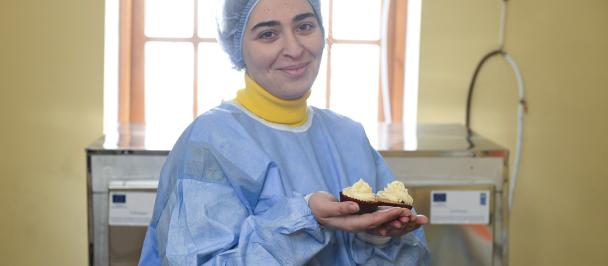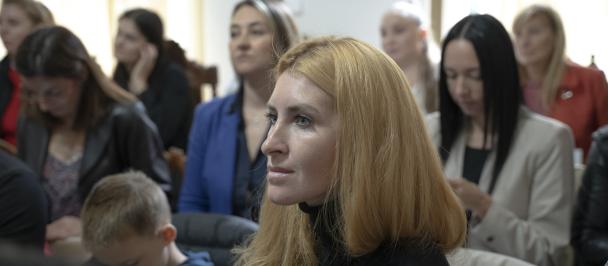Handicraft education supports social cohesion and empowers women affected by conflict
Women Join Hands for Peace
February 7, 2023
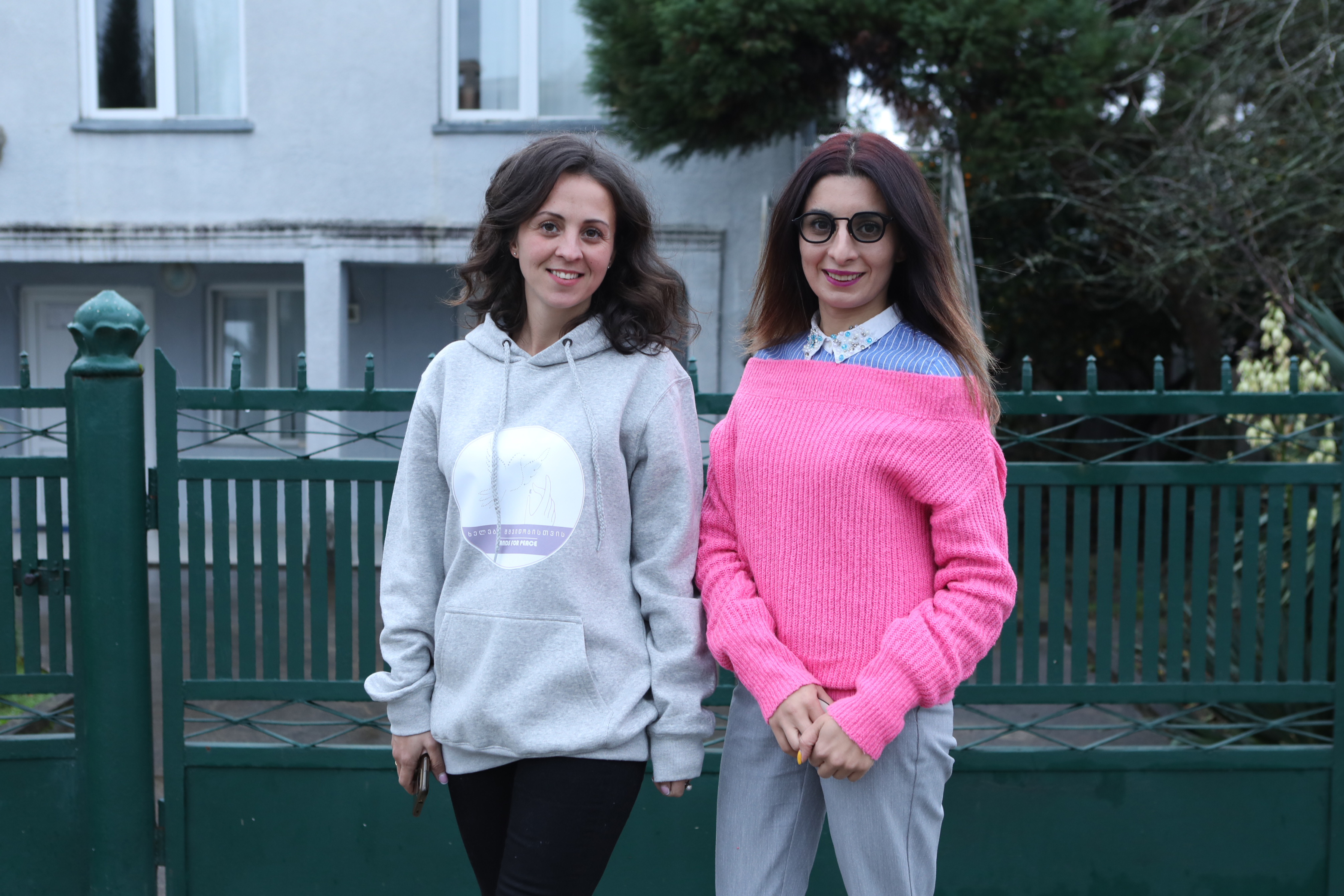
Mako Chkadua (L) and Malo Kotua (R) standing in front of the 'Hands for Peace' office in Zugdidi.
Mako Chkadua and Malo Kotua, originally from Abkhazia, Georgia, and now based in the Samegrelo region, turned their passion for handicrafts into an opportunity for disadvantaged women. With the support of the European Union and UNDP, they train conflict-affected women in handicrafts to support their livelihoods and build social cohesion among internally displaced people and host communities.
Mako and Malo used their hands-on experience in handicraft entrepreneurship and community activism to successfully bid for a grant under the EU4Dialogue programme. It’s the first major initiative for both Mako and Malo and their ‘Hands for Peace’ non-governmental organization to support conflict-affected women.
Leading by Example
Under the EU and UNDP project, Mako and Malo train 42 women in one of four handicraft areas: knitting, embroidery, tailoring, and macramé. They say the initiative helps women professionally grow, earn a living, improve their livelihoods, and increase their self-reliance. In addition, considering their lived experience as internally displaced people, the two women aspire to contribute to social cohesion and community resilience.
"As Internally Displaced Persons, IDPs, we found it hard to integrate into host communities. Now, the younger generation is different, but in our childhood, people would make clear distinctions between IDPs and locals,” Mako recalls. She explains that by training women in handicrafts, ‘Hands for Peace’ contributes to social cohesion and helps the displaced and host communities find a common ground.
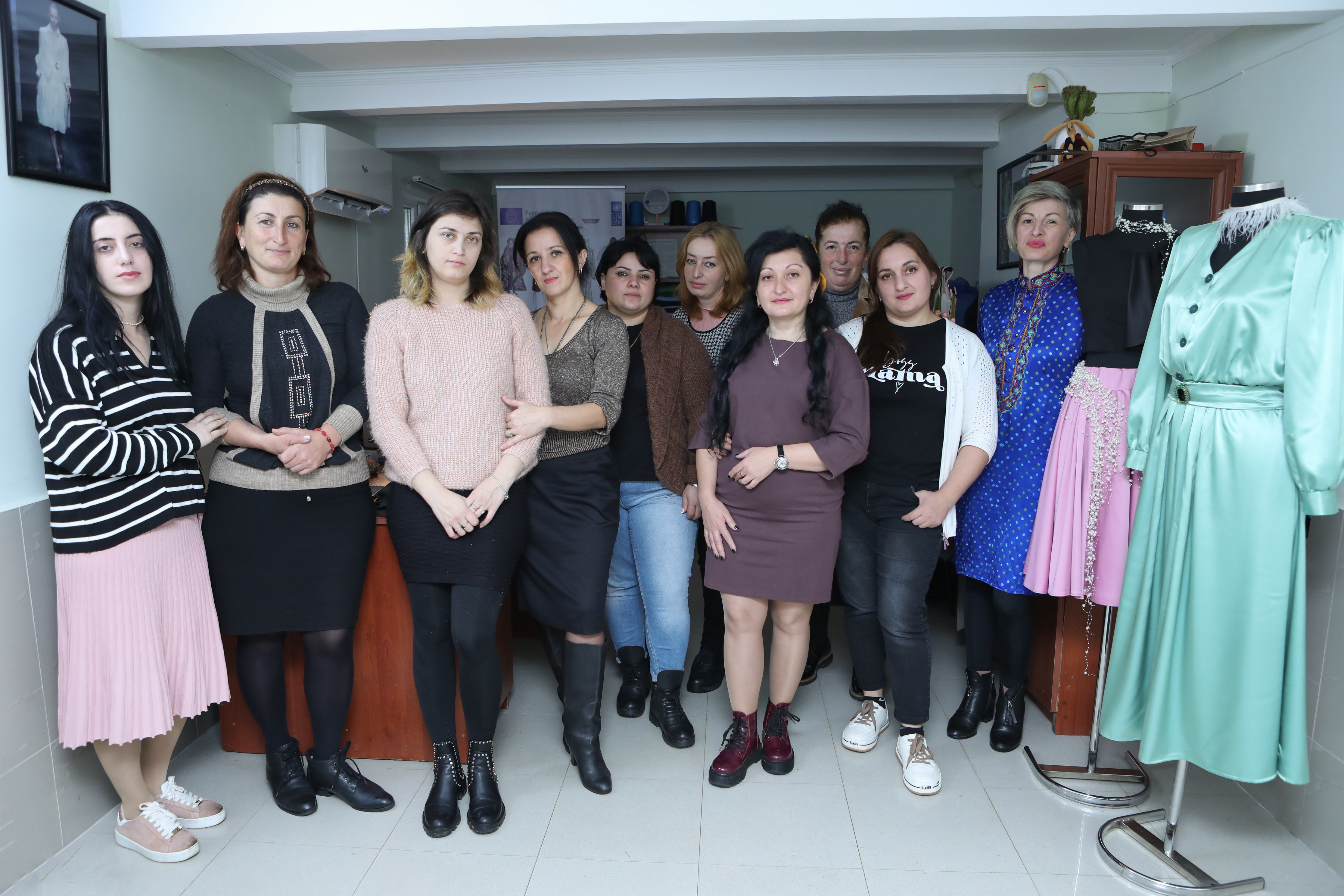
The tailoring class students at the 'Hands for Peace' premises.
‘Hands for Peace’ reached out for women from various social groups and walks of life - mothers of many children, single parents, women in early marriages who could not complete their education, women displaced by conflict, and women from host communities in Zugdidi, Tsalenjikha and Khobi municipalities.
"As Internally Displaced Persons, IDPs, we found it hard to integrate into host communities. Now, the younger generation is different, but in our childhood, people would make clear distinctions between IDPs and locals”.
33-year-old Mako and 31-year-old Malo are both originally from the Gali district in Abkhazia. Mako spent half of her life in collective IDP housing in Zugdidi, while Malo frequently moved in between her native Saberio village in Gali and the city of Zugdidi in Samegrelo. They first met in Zugdidi in 2017, where they returned after years of studies in Tbilisi.
Their paths crossed again in 2018 at the Charity Humanitarian Center Abkhazeti (CHCA), where Malo taught polymer clay handcrafts, while Mako and her two colleagues, Monika Abralava and Salome Kardava, attended training in soutache for IDP women. As exceptional students, Mako, Monika, and Salome soon joined the ranks of handicraft teachers at the CHCA. In 2019, the four women came up with the idea of the non-profit ‘Hands for Peace’, to help other IDP women in handicraft learning.
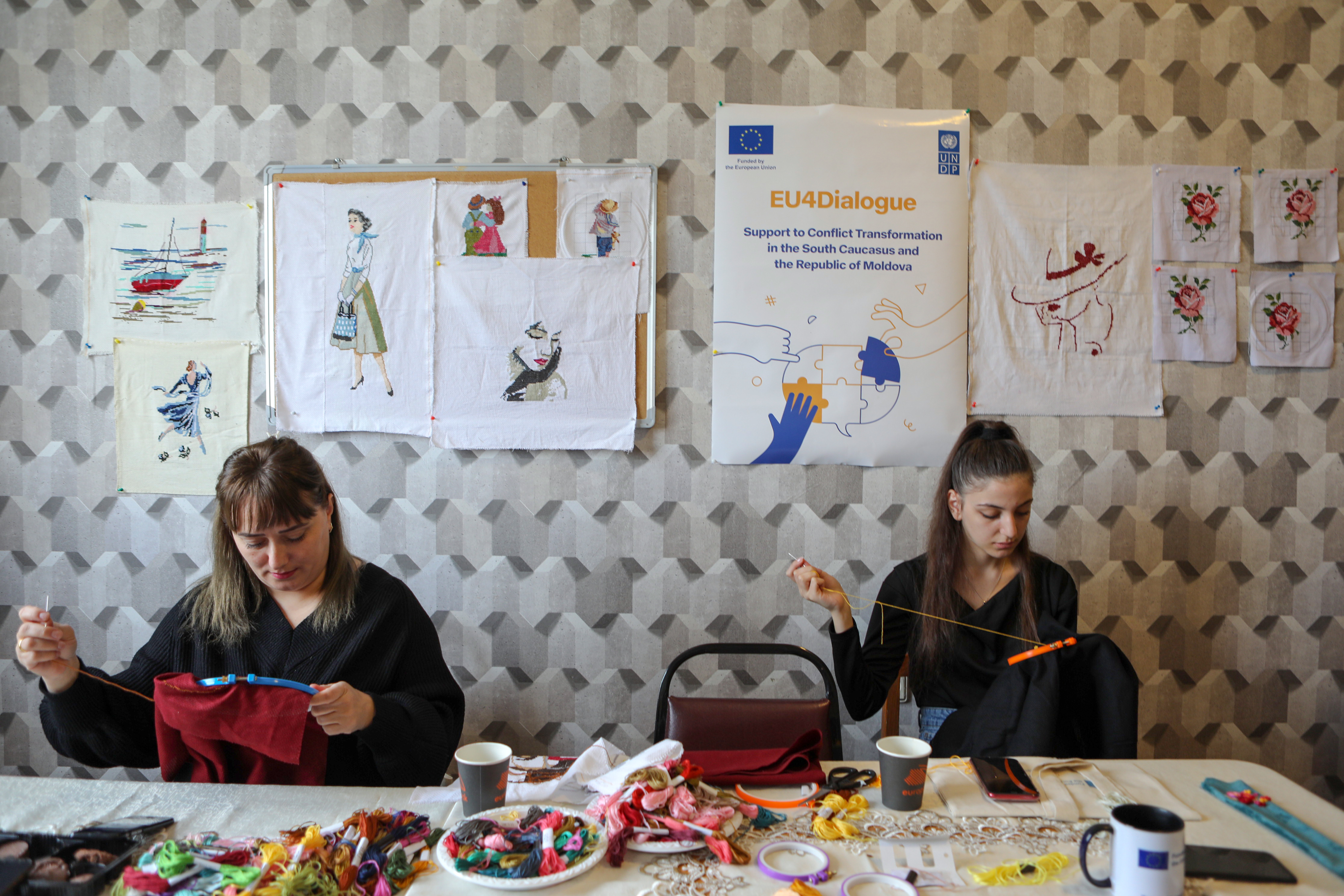
The embroidering class at the IDP Settlement in Zugdidi.
Challenges and Opportunities – A Way Ahead
Mako and Malo note high interest among women across the region to attend their handicraft classes. Last year, they received over 150 online and hardcopy applications. To assist those women who could not apply online, Mako and Malo toured villages with hardcopy application forms.
Despite their interest, a lot of women could not join the training because of their domestic chores and care work. Some had young children who could not yet be enrolled in kindergartens, making prospective handicraft students miss out on the classes.
Several participants of the ‘Hands for Peace’ project faced a similar issue, but the training course organizers found a solution. They invited mothers to come to the classes with their children and set up a small space in the office where youngsters could play while their mothers mastered needlework.
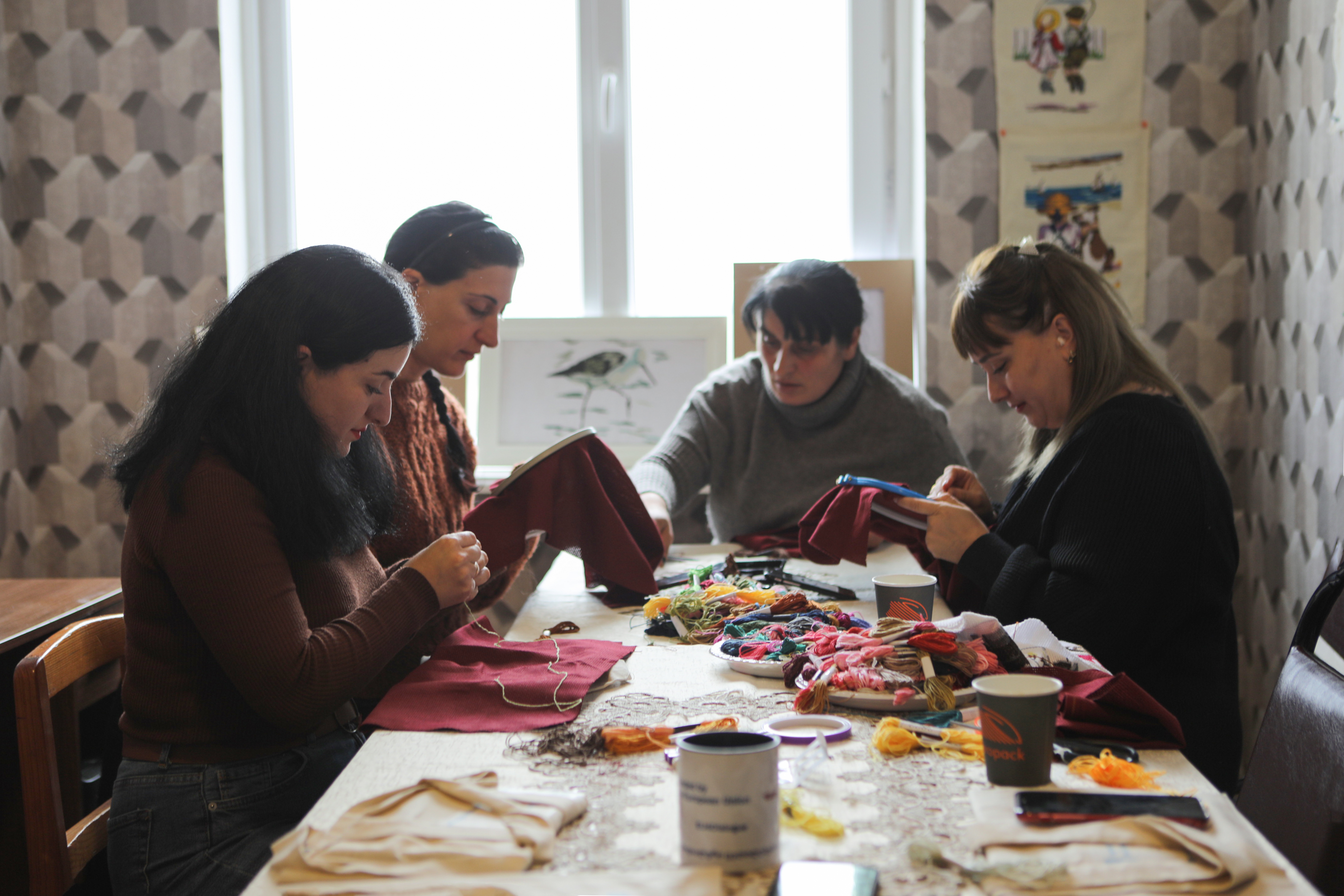
The embroidering class at the IDP Settlement in Zugdidi.
Mako notes that it takes more than just learning handicrafts to start earning a living. "A training or two is far from enough. We are doing our best to ensure that our involvement does not end up with sewing classes alone. The project includes further training for these women to continue their work independently, to learn how to sell their products and how to use funding opportunities, such as grant programmes," she says.
Both Mako and Malo are optimistic about the future. They see that their work for empowering women yields results. Two of their students already found employment at the enterprises run by their trainers. And the tailoring class participants got an order from a local kindergarten to make 25 dresses for a New Year celebration.
According to Mako, "these women are making so much progress. Now they are independently looking for funding. They have grown professionally right before our eyes."
###
Disclaimer: This story was produced with the financial support of the European Union and UNDP under the EU4Dialogue project. Its contents do not necessarily reflect the views of the European Union and UNDP.
'Hands for Peace' reaches out to women from various social groups and walks of life – mothers of children with disabilities, single parents, women in early marriages who could not complete their education, women from families displaced by conflict, and women from host communities.

 Locations
Locations


